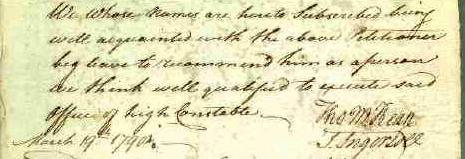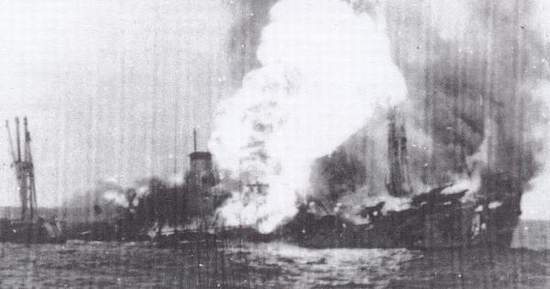" Thomas McKean " was born in New London Township, Chester County, Pennsylvania on March 19, 1734 the son of William and Letitia Finney McKean. He was raised a Presbyterian and educated by a Presbyterian clergyman. " McKean " was of Scots-Irish stock and was a man of vigorous personality, "with a thin face, hawk's nose and hot eyes."
After moving to Delaware, " McKean " lived in New Castle and read law. He had important family connections there and he wasted no time pursuing a career in politics.
At the age of eighteen, he became deputy prothonotary of New Castle County, then moved from one public office to another: deputy general; clerk of the provincial assembly; member of the assembly; judge of the court of common pleas; collector of customs for New Castle County. He was admitted to the bar at twenty years of age and had a legal practice not only in the Lower Counties but in New Jersey and Pennsylvania as well.
" Thomas McKean " was sent to the First Congress as a representative from Delaware in September, 1774 and he served in that position through 1776. When he was appointed he had just married his second wife, Sarah Armitage of New Castle. His first wife, Mary Borden, the daughter of Joseph Borden of Bordentown, New Jersey, and sister of the wife of Francis Hopkinson, had died in 1773, leaving him with six children. He would father four more children with his second wife.
At the Second Congress, " McKean " was a true fighter for independence. Since the Stamp Act of 1765 he had opposed British rule. He believed that the crown had "no right to regulate American affairs in any way".
In June, 1776, " McKean " returned to Delaware and gained authority for its delegates to vote for independence. A few days after " McKean " cast his vote, he left Congress to command a battalion of troops to assist General Washington at Perth Amboy, New Jersey.
He was not available when most Signers placed their signatures on the Declaration on August 2, 1776. There is considerable question as to when " McKean " actually signed the Declaration. He certainly did not do this in August, and although he claimed in old age that he attached his name some time in 1776, it did not appear on the printed copy that was authenticated on January 17, 1777, and it is assumed that he signed after that date.

" Signature of Thomas McKean "
" Thomas McKean " helped frame the Delaware constitution in 1776 and signed the Articles of Confederation. He was elected Speaker of the assembly of Delaware in 1777.
When then Delaware President " John McKinly " was taken prisoner by the British he was elected as "President" of Delaware on September 22, 1777, an office he held for less than a month, resigning on October 20, 1777.
His resignation was due to him being notified that he was appointed the Chief Justice of Pennsylvania. He served as Pennsylvania's Chief Justice until 1799. " McKean " also served the State of Delaware during this time as a delegate to the Continental Congress from 1778 through 1782. In 1781 he served briefly as president of the Continental Congress.
In 1799 he was elected as the Governor of Pennslyvania where he served until 1808.
" Thomas McKean " died in Philadelphia on June 24, 1817 at the age of eighy-three where he was interred in Laurel Hill Cemetery.

The
S.S. Thomas McKean
( a World War II Liberty Cargo Ship )
was named in his honor !
( Thomas McKean was the only known Delawarean to have a ship named in his honor )
The ship was sunk by
" German Submarine U-505 "
on June 29, 1942


Photo of the S.S. Thomas McKean being attacked and sunk in WW II !






Email any questions or comments to:
Russ Pickett
Last update: September 26, 2022







